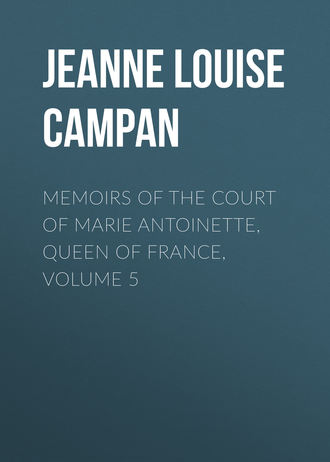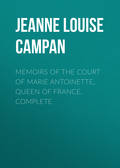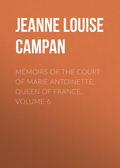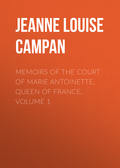
Jeanne Louise Henriette Campan
Memoirs of the Court of Marie Antoinette, Queen of France, Volume 5
M. de J–, a colonel attached to the staff of the army, was fortunate enough to render several services to the Queen, and acquitted himself with discretion and dignity of various important missions.
[During the Queen's detention in the Temple he introduced himself Into that prison in the dress of a lamplighter, and there discharged his duty unrecognised.—MADAME CAMPAN.]
Their Majesties had the highest confidence in him, although it frequently happened that his prudence, when inconsiderate projects were under discussion, brought upon him the charge of adopting the principles of the constitutionals. Being sent to Turin, he had some difficulty in dissuading the Princes from a scheme they had formed at that period of reentering France, with a very weak army, by way of Lyons; and when, in a council which lasted till three o'clock in the morning, he showed his instructions, and demonstrated that the measure would endanger the King, the Comte d'Artois alone declared against the plan, which emanated from the Prince de Conde.
Among the persons employed in subordinate situations, whom the critical circumstances of the times involved in affairs of importance, was M. de Goguelat, a geographical engineer at Versailles, and an excellent draughtsman. He made plans of St. Cloud and Trianon for the Queen; she was very much pleased with them, and had the engineer admitted into the staff of the army. At the commencement of the Revolution he was sent to Count Esterhazy, at Valenciennes, in the capacity of aide-de-camp. The latter rank was given him solely to get him away from Versailles, where his rashness endangered the Queen during the earlier months of the Assembly of the States General. Making a parade of his devotion to the King's interests, he went repeatedly to the tribunes of the Assembly, and there openly railed at all the motions of the deputies, and then returned to the Queen's antechamber, where he repeated all that he had just heard, or had had the imprudence to say. Unfortunately, at the same time that the Queen sent away M. de Goguelat, she still believed that, in a dangerous predicament, requiring great self-devotion, the man might be employed advantageously. In 1791 he was commissioned to act in concert with the Marquis de Bouille in furtherance of the King's intended escape.
[See the "Memoirs" of M. de Bouille, those of the Duc de Choiseul, and the account of the journey to Varennes, by M. de Fontanges, in "Weber's Memoirs."—NOTE BY THE EDITOR.]
Projectors in great numbers endeavoured to introduce themselves not only to the Queen, but to Madame Elisabeth, who had communications with many individuals who took upon themselves to make plans for the conduct of the Court. The Baron de Gilliers and M. de Vanoise were of this description; they went to the Baronne de Mackau's, where the Princess spent almost all her evenings. The Queen did not like these meetings, where Madame Elisabeth might adopt views in opposition to the King's intentions or her own.
The Queen gave frequent audiences to M. de La Fayette. One day, when he was in her inner closet, his aides-de-camp, who waited for him, were walking up and down the great room where the persons in attendance remained. Some imprudent young women were thoughtless enough to say, with the intention of being overheard by those officers, that it was very alarming to see the Queen alone with a rebel and a brigand. I was annoyed at their indiscretion, and imposed silence on them. One of them persisted in the appellation "brigand." I told her that M. de La Fayette well deserved the name of rebel, but that the title of leader of a party was given by history to every man commanding forty thousand men, a capital, and forty leagues of country; that kings had frequently treated with such leaders, and if it was convenient to the Queen to do the same, it remained for us only to be silent and respect her actions. On the morrow the Queen, with a serious air; but with the greatest kindness, asked what I had said respecting M. de La Fayette on the preceding day; adding that she had been assured I had enjoined her women silence, because they did not like him, and that I had taken his part. I repeated what had passed to the Queen, word for word. She condescended to tell me that I had done perfectly right.
Whenever any false reports respecting me were conveyed to her she was kind enough to inform me of them; and they had no effect on the confidence with which she continued to honour me, and which I am happy to think I have justified even at the risk of my life.
Mesdames, the King's aunts, set out from Bellevue in the beginning of the year 1791. Alexandre Berthier, afterwards Prince de Neufchatel, then a colonel on the staff of the army, and commandant of the National Guard of Versailles, facilitated the departure of Mesdames. The Jacobins of that town procured his dismissal, and he ran the greatest risk, on account of having rendered this service to these Princesses.
I went to take leave of Madame Victoire. I little thought that I was then seeing her for the last time. She received me alone in her closet, and assured
[General Berthier justified the monarch's confidence by a firm and prudent line of conduct which entitled him to the highest military honours, and to the esteem of the great warrior whose fortune, dangers, and glory he afterwards shared. This officer, full of honour, and gifted with the highest courage, was shut into the courtyard of Bellevue by his own troop, and ran great risk of being murdered. It was not until the 14th of March that he succeeded in executing his instructions ("Memoirs of Mesdames," by Montigny, vol. i.)]
me that she hoped, as well as wished, soon to return to France; that the French would be much to be pitied if the excesses of the Revolution should arrive at such a pitch as to force her to prolong her absence. I knew from the Queen that the departure of Mesdames was deemed necessary, in order to leave the King free to act when he should be compelled to go away with his family. It being impossible that the constitution of the clergy should be otherwise than in direct opposition to the religious principles of Mesdames, they thought their journey to Rome would be attributed to piety alone. It was, however, difficult to deceive an Assembly which weighed the slightest actions of the royal family, and from that moment they were more than ever alive to what was passing at the Tuileries.
Mesdames were desirous of taking Madame Elisabeth to Rome. The free exercise of religion, the happiness of taking refuge with the head of the Church, and the prospect of living in safety with her aunts, whom she tenderly loved, were sacrificed by that virtuous Princess to her attachment to the King.
The oath required of priests by the civil constitution of the clergy introduced into France a division which added to the dangers by which the King was already surrounded.
[The priests were required to swear to the civil constitution of the clergy of 1790, by which all the former bishoprics and parishes were remodelled, and the priests and bishops elected by the people. Most refused, and under the name of 'pretres insermentes' (as opposed to the few who took the oath, 'pretres assermentes') were bitterly persecuted. A simple promise to obey the constitution of the State was substituted by Napoleon as soon as he came to power.]
Mirabeau spent a whole night with the cure of St. Eustache, confessor of the King and Queen, to persuade him to take the oath required by that constitution. Their Majesties chose another confessor, who remained unknown.
A few months afterwards (2d April, 1791), the too celebrated Mirabeau, the mercenary democrat and venal royalist, terminated his career. The Queen regretted him, and was astonished at her own regret; but she had hoped that he who had possessed adroitness and weight enough to throw everything into confusion would have been able by the same means to repair the mischief he had caused. Much has been said respecting the cause of Mirabeau's death. M. Cabanis, his friend and physician, denied that he was poisoned. M. Vicq-d'Azyr assured the Queen that the 'proces-verbal' drawn up on the state of the intestines would apply just as well to a case of death produced by violent remedies as to one produced by poison. He said, also, that the report had been faithful; but that it was prudent to conclude it by a declaration of natural death, since, in the critical state in which France then was, if a suspicion of foul play were admitted, a person innocent of any such crime might be sacrificed to public vengeance.
ETEXT EDITOR'S BOOKMARKS:
Advised the King not to separate himself from his army
Grand-Dieu, mamma! will it be yesterday over again?
Mirabeau forgot that it was more easy to do harm than good
Never shall a drop of French blood be shed by my order
Saw no other advantage in it than that of saving her own life
That air of truth which always carries conviction
When kings become prisoners they are very near death
Whispered in his mother's ear, "Was that right?"





